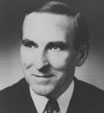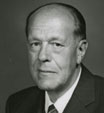
Honorable Edward F. Hanify
The Hanify Memorial Lecture honors the memory of Judge Edward F. Hanify, a native of Fall River, Massachusetts, who graduated from Holy Cross in 1904.
Shortly after having completed his studies at Harvard Law School, Mr. Hanify served as city solicitor for his native city. In 1912, he was appointed presiding justice of the Second District Court of Bristol County. At the age of thirty-one, he was one of the youngest justices ever appointed to the bench in Massachusetts. In 1929, he was appointed a justice of the Superior Court and served on that court for a quarter of a century until his death in 1954.
As a young district court judge, he pioneered in the humane treatment of juvenile offenders, insisting that they be treated "not as criminals, but as children in need of aid, encouragement, and guidance.” His juvenile court became an early successful model for constructive use of all available family and community resources, including the probation system, to save youngsters from what he termed "the stigma...and evils of incarceration.” Holy Cross recognizes his constructive work for social betterment when it awarded him an Honorary Doctor of Laws degree in 1919.
Judge Hanify's twenty-five years of service on the Superior Court were marked by his assignment to preside as trial judge at many complex and historic cases. His learning, fairness, courtesy, and compassion are remembered as representing in full measure the highest ideals of judicial conduct and public service. He served as President of the Holy Cross Alumni Association and five of his descendants, three sons, a grandson, and one great-grandson have followed his steps to the College.

Weston Howland
After the late Weston Howland was graduated from Haverford in 1917, he spent the next several years as a volunteer with the American Friends Service Committee in post-World War I rehabilitation efforts in France, Germany, and Russia. He returned to this country in 1920 and began a most distinguished and successful career of 56 years in the textile industry.
True to the ideals of his Quaker heritage, in the midst of a diversity of business responsibilities, he sustained an unrelenting dedication to the service of the nation and to the foundation and operation of a wide range of humanitarian institutions.
During World War II, he served on the staff of General William Donovan in the office of Strategic Services. A mere listing of some of the institutions to which he gave generously of his resources, talents, and time gives some insight into his energetic concern for others: President of the Sol-E-Mar Hospital for children suffering from bone tuberculosis; a founder and president of the Boys' and Girls' Camp of Boston, which provided for the health and recreation of some 80,000 under-privileged children over a period of 40 years; founder and president of The New England Arthritis and Rheumatism Foundation; and trustee of the Rehabilitation Institute, a facility for the rehabilitation of the handicapped that is now part of Tufts New England Medical Center. By appointment of President Eisenhower, he served with the National Advisory Council on Vocational Rehabilitation.
Weston Howland's admiration and respect for Judge Hanify, his warm affection for the Hanify family and his faith in the purposes and objectives of the College of the Holy Cross led him to establish the annual Hanify Memorial Lecture. His presence among us was ever a joy and inspiration, and his is remembered with grateful benediction. At the request of the Hanify family, this lecture is now titled "The Hanify-Howland Memorial Lecture."
Photo by Bachrach courtesy of the College of the Holy Cross Archives.

